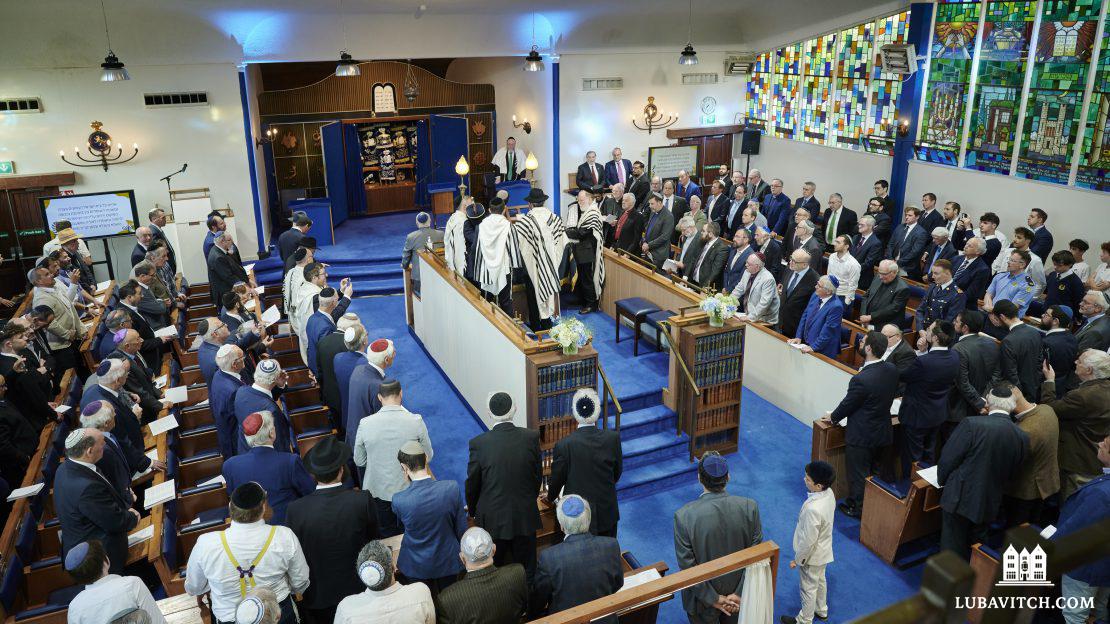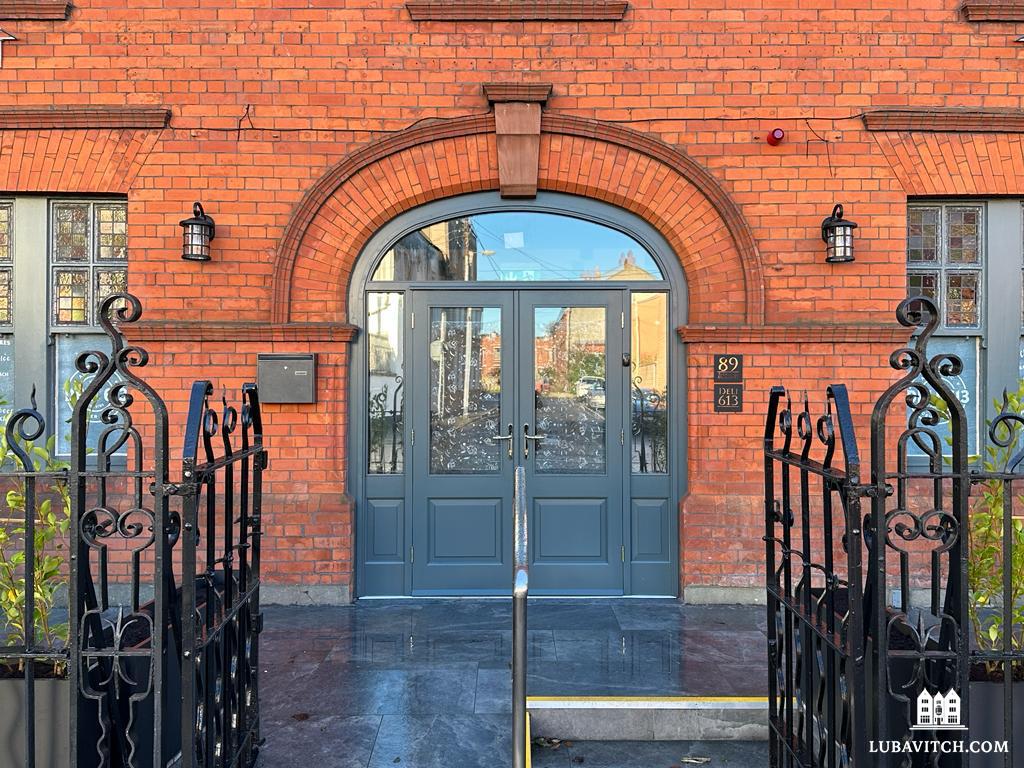
How Ireland’s Jews Are Responding to Rising Hate
by Leibel Kahan – Lubavitch.com
Over one-third of Irish Christians polled in 2024 believed that Jews “still talk too much about what happened to them in the Holocaust.”
The findings, from a study conducted by Professors Motti Inbari (University of North Carolina at Pembroke) and Kirill Bumin (Boston University and Metropolitan College), also showed extremely low support for Israel in the current war among Irish respondents, with sympathy for the Palestinian effort remarkably higher than in the United States.
For Ireland’s small Jewish community of about 2,700 people, these numbers are not shocking — but they reflect a sobering reality of growing antisemitism. Nonetheless, daily Jewish life continues despite or perhaps, in spite— of it.
“Not everyone that visits Deli 613 is Jewish,” says Rabbi Zalman Lent, referring to Ireland’s only kosher establishment — a widely-praised delicatessen in the heart of Dublin. “But they all agree that the food is worth coming back for.” He and his wife Rifky are the Chabad emissaries to Ireland, having lived there since 2000. Their Chabad Centre in South Dublin is a hub not only for Jewish comfort food, but for Jewish practice and connection in a country where Jews make up a tiny fraction of the population.
Located at the Chabad Centre on a quiet street, Deli 613 buzzes with a contrast of Hebrew and Irish brogue — foreigners and locals mingling and enjoying salt-beef sandwiches and shawarma pitas. It’s a peaceful scene that seems to be quite at odds with the outside perception of Jewish life in Ireland.
Antisemitism on the Rise
The October 7th attacks in Israel and the war that followed sent ripples across Ireland’s small but proud Jewish community. While Dublin has long been considered a safe city for Jews, its politics can tell another story.
“Most Jewish people here strongly oppose Ireland’s hostile anti-Israel stance,” says the country’s Chief Rabbi Yoni Wieder. Leader of the Dublin Hebrew Congregation, Rabbi Wieder was appointed to the position of Chief Rabbi in 2024 — the eighth in Ireland’s history. “Many are downright ashamed of their government. There is no doubt in my mind that the recent rhetoric by Irish political leaders against Israel has contributed to hatred against Jews in this country.”
Making matters worse for Jews is that they have no friends in government. “Many Jews feel the tension,” says Rabbi Lent. “There’s no pro-Israel voice here — not in politics, not in the press.”

Media, Misinformation, and Silence
While Ireland has not seen the kind of violent antisemitism reported in some other European countries, the emotional toll of rising hostility — particularly online and in political rhetoric — is very real. Graffiti with hateful messages, shouted slurs, and vile posts on social media have become increasingly common. Meanwhile, Ireland’s politicians and mainstream media often reinforce antisemitic tropes.
Rabbi Lent believes that the nonstop coverage about the war has created a national obsession with the conflict. “It’s relentless. The media feeds people a one-sided narrative and the government does nothing to push back. In some ways, it legitimizes hostility.”
Aviva Cohen, a Dublin native and director at the Chabad Centre, sees it as part of a much older dynamic. “Antisemitism in Ireland is nothing new,” she says. “A lot of the left-wing people I grew up with went into media and politics, influencing the younger generation.”
Still, the situation on the ground varies widely. “Antisemitism is not a day-to-day issue for all Jews here — there have been significantly fewer incidents here than in Britain or France since October 7th,” explains Rabbi Wieder. “But there are pressing concerns. We raise them with politicians and the media when needed, but often those concerns are dismissed or denied.
And yet, he observes, as frustrating as it is, “it doesn’t define who we are or how we live.”
Community member Brigitte Frenkel agrees. “There’s an uneasy feeling — one is aware of it but it is not a constant worry”
Jewish Youth Under Pressure
Not so for Ireland’s Jewish youth — many of whom are navigating a far more uncertain social landscape.
Chief Rabbi Wieder sees it as one of the biggest concerns. “Being exposed to relentless antisemitism as a young teenager in school can be extremely unsettling, especially when it feels like their identity is being delegitimized,” he explains. “I’ve spoken to many school children in recent months who feel afraid because they are Jewish and avoid talking about being Jewish in front of their non-Jewish peers.”
Ironically, he notes, the discomfort is igniting a deeper engagement with Jewish identity. “So many young Jews are now exploring and engaging with their Jewish history and connection to the Land of Israel.”
“That’s why having Chabad’s Hebrew school has been so important,” Frenkel says. “It’s a safe space where they can feel fully Jewish and supported.”

A Community Grows
This deeper engagement is not only happening among the youth, but across the Jewish community in Dublin as a whole. Rather than retreating, many are leaning in.
Young Jews — many of them Israeli — now make up a growing part of the community. Dubbed the “Silicon Valley of Europe,” Dublin has recently become a hub for young professionals working in the European headquarters of companies like Google, Meta, Apple, or Microsoft.
Recognizing this shift, the Lents relocated their Chabad center two years ago to a more central and accessible location. “People are looking for something real,” Rabbi Lent says. “They want connection — to tradition, to each other, to something Jewish that feels alive.” And they’re finding it: Places like Deli 613 have become gathering spaces not only for Irish Jews, but also for non-Jewish locals — a subtle expression of unity and harmony in an often polarized atmosphere.
Besides the deli, Chabad offers weekly Shabbat meals, Sunday Hebrew school, and adult Torah classes. “In times like these, people are looking for a place they feel they can belong,” says Rifky Lent. “Whether it’s children at Hebrew school or young professionals around the Shabbat table, we want them to feel safe, supported, and connected to their Judaism.” That sense of connection is reflected in growing participation: this summer, the Chabad’s camp is expecting its largest group of children yet.
Frenkel regularly attends Chabad’s Shabbat dinners and events. “It’s so important for Jews in Ireland to have this sense of community,” she says. At Chabad, “it’s not just about synagogue. It’s always open — there’s always someone to talk to.”
Cohen echoes this sentiment: “People want to be around other Jewish people and Jewish events — to feel that they’re part of a Jewish family.”
Although security at Chabad and other Jewish institutions has been heightened, the environment remains open. “We don’t do politics. Everyone is welcome,” Lent says. “We constantly pray for the hostages and for peace — not just in Israel, but for global peace.”
Looking Ahead
Dublin’s small community continues to stand tall in the face of antisemitism and this slow awakening is cause for optimism. Rabbi Lent notes that more people are beginning to question the dominant narrative around the war. “There’s still a lot of bias in the media and politics,” he says, “but many are starting to see through it.” Jewish life in Dublin continues to endure and grow — quietly, steadily, and proudly.












